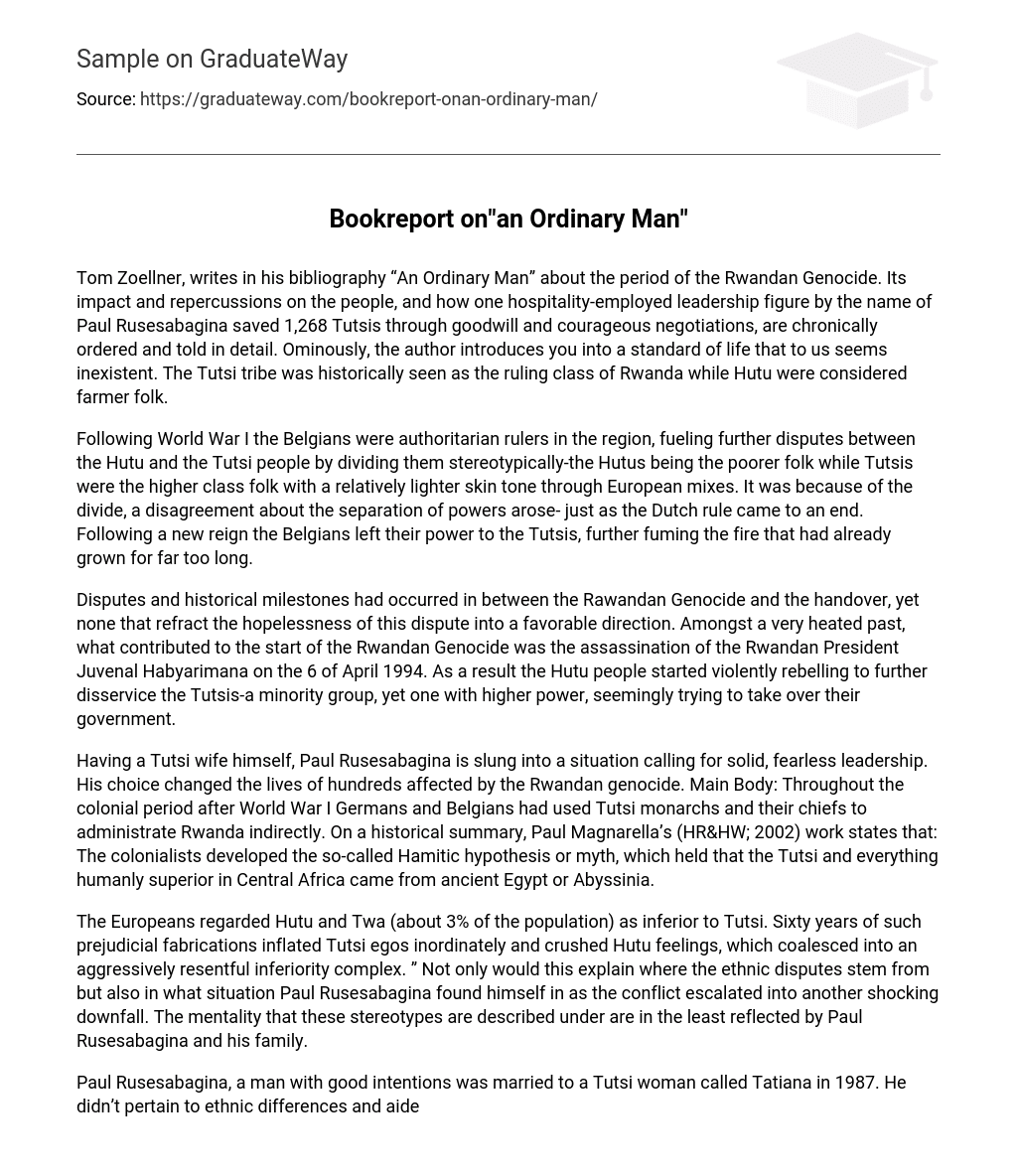“An Ordinary Man” by Tom Zoellner explores the impact of the Rwandan Genocide on individuals. The book focuses on Paul Rusesabagina, a hospitality worker who displayed remarkable acts of kindness and conducted brave negotiations to save 1,268 Tutsis. Through this narrative, Zoellner introduces a distinct social hierarchy in Rwanda where historically the ruling class belonged to the Tutsi tribe while the Hutu were primarily engaged in agricultural activities.
After World War I, the Belgians became authoritarian rulers in the region, which escalated disputes between the Hutu and the Tutsi people. The Belgians fueled these conflicts by dividing them along stereotypical lines – portraying the Hutus as poorer individuals and considering the Tutsis as the higher class due to their relatively lighter skin tone resulting from European mixes. This division led to disagreements about the separation of powers, coinciding with the end of Dutch rule. Subsequently, under a new reign, the Belgians transferred their power to the Tutsis, further exacerbating the already long-standing tensions.
Despite numerous conflicts and historical incidents between the Rawandan Genocide and the handover, none of them resulted in a constructive resolution to this dispute. The turbulent history linked to the assassination of Rwandan President Juvenal Habyarimana on April 6, 1994, played a significant role in triggering the outbreak of the Rwandan Genocide. As a result, the Hutu population initiated a violent uprising against the Tutsis, who were a minority group but held more political power, seemingly with an aim to take over governance.
Paul Rusesabagina, who has a Tutsi wife, finds himself in a situation that requires strong, fearless leadership, ultimately impacting the lives of many affected by the Rwandan genocide. During the period of colonization following World War I, both Germans and Belgians utilized Tutsi monarchs and chiefs to administer Rwanda indirectly. According to Paul Magnarella’s (HR&HW 2002) work, this colonial era gave rise to the Hamitic hypothesis or myth, which claimed that the Tutsi and any superior aspects of Central Africa originated from ancient Egypt or Abyssinia.
The Europeans considered the Hutu and Twa (approximately 3% of the population) to be of lower status compared to the Tutsi. This prejudiced fabrication persisted for sixty years, leading to an excessive boost in Tutsi egos while crushing Hutu sentiments. As a result, an aggressively resentful inferiority complex formed among the Hutu. This explanation not only clarifies the origins of ethnic disputes but also sheds light on the circumstances faced by Paul Rusesabagina as the conflict escalated dramatically. Paul Rusesabagina and his family embody the mindset described by these stereotypes.
Paul Rusesabagina, a man with good intentions, married Tatiana, a Tutsi woman, in 1987. Despite their ethnic differences, he helped his wife escape from prejudices at her workplace. Tatiana also embraced his two children as part of their family, and they had a child together. As Maxwell (2007) states, “Character makes trust possible. And trust makes leadership possible. That is the Law of Solid Ground” (p. 64). However, because of his relationship with Tatiana and their Tutsi child, Rusesabagina faced significant divisions.
During the invasion of his neighborhood by the Interhamwe and the subsequent slaughters, Paul showed kindness by providing shelter in his home for 30 Tutsi neighbors. However, his home was also targeted by those searching for Tutsis. In response to death threats against the Tutsis, Paul promptly took action and offered monetary compensation to the soldiers in exchange for sparing the lives of his fellow Tutsis. After a hasty negotiation that lacked adequate compensation from the soldiers, the Tutsis were granted freedom and were transported to a hotel, with a significant amount of money involved.
Paul’s leadership potential enabled him to earn trust. This potential was established through his fearless negotiations with the Interhamwe. In hindsight, it is difficult to anticipate one’s actions under these circumstances. My belief is that Paul’s character and background in non-violent solutions laid the foundation for his instinct to peacefully confront the opposition from the start. As a Hutu, he felt compelled to act as the negotiator between the two ethnic groups.
Certain tools will exist in your life and the way you choose to use them determines character and a sense of responsibility towards those not as fortunate. Paul stood his ground and instead took the long moral highroad that his position was able to provide and started contacting local and foreign governments asking for aid and protection. Following a number of phone-calls, the UN agreed to evacuate foreign guests, yet to Paul’s disappointment, refused security for the hotel amidst the raging crisis.
Assisting the individuals stuck in his lodge, Paul Rusessabagina motivated them to contact anyone they knew in positions of influence. This strategy proved successful as several guests were rescued after engaging in discussions with foreign governments. Thanks to Paul Rusessabagina’s favorable reputation, all individuals were safely evacuated without encountering any harm. Although viewed as an ordinary man, Paul Rusessabagina had a unique ability to identify opportunities amidst challenging circumstances. He remained composed under pressure and utilized every available resource to aid their situation.
By continuing operations in the hotel, Paul Rusessabagina’s staff members played a crucial role in the success of his plan. In summary, observing Paul Rusessabagina’s actions teaches us that there are always choices in any situation. By using our surroundings without being influenced by fear, we can accomplish something that benefits others. Fear is essentially a sensation of the unfamiliar and frequently limits our progress.
Fortunately, we are not facing the same challenges as Paul Rusessabagina did after the 1994 assassination. Today, we have fewer obstacles and the means to achieve our goals. It is our responsibility to use our abilities to help the remaining 85-90% of the population. For more information, please see this source or this source.





